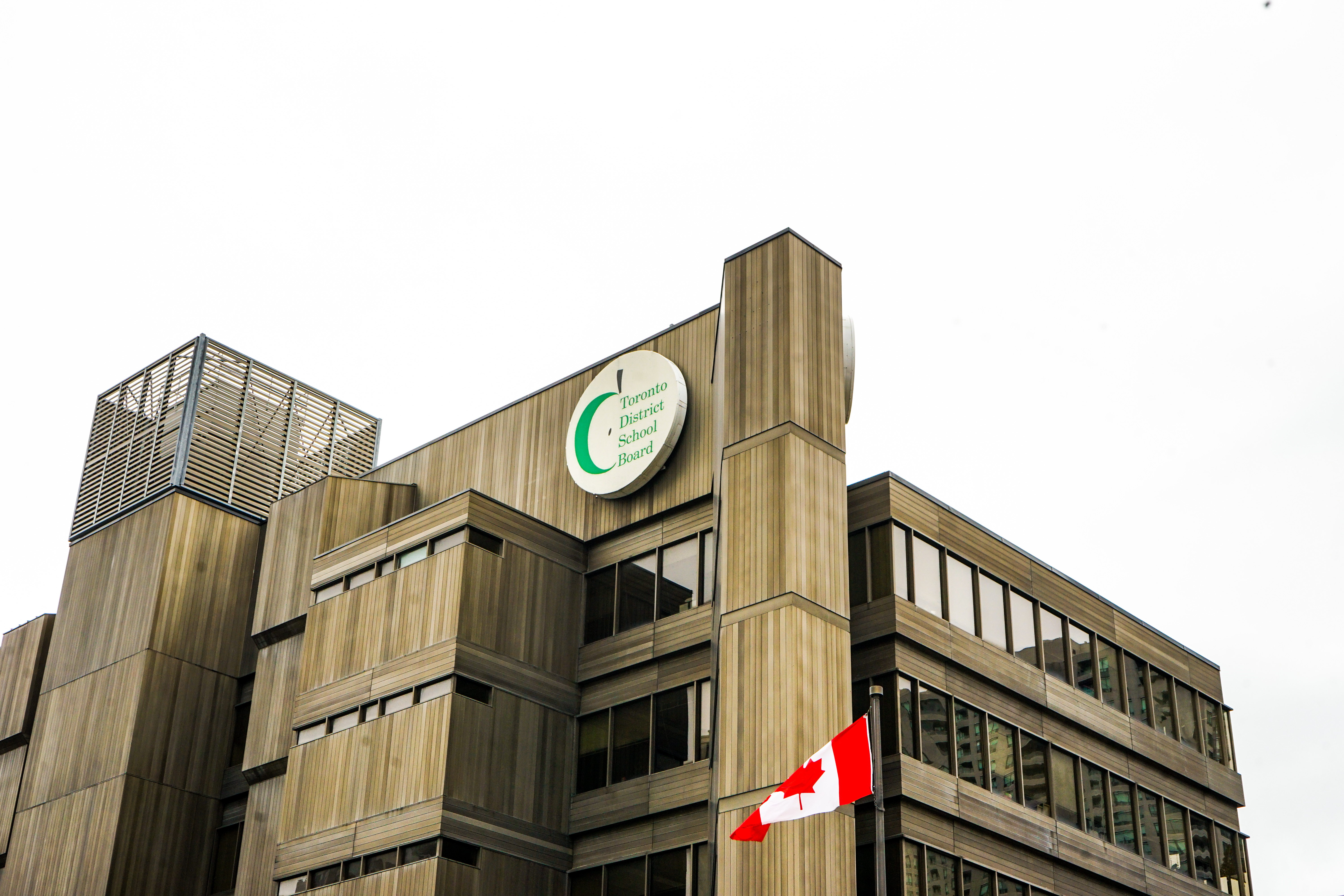TDSB Trustees: what we know about them so far
 School Magazine wanted to find out more about the trustees for Toronto District School Board (TDSB) as well as for the Toronto Catholic District School Board (TCDSB). These people will oversee billions of dollars in spending and are responsible for hiring their boards’ Directors of Education. So, we thought it would be good to know a bit more about their views on important current issues.
School Magazine wanted to find out more about the trustees for Toronto District School Board (TDSB) as well as for the Toronto Catholic District School Board (TCDSB). These people will oversee billions of dollars in spending and are responsible for hiring their boards’ Directors of Education. So, we thought it would be good to know a bit more about their views on important current issues.
We gleaned some information from trustees’ campaign websites and asked these questions:
- What is your view of the consultation process set up by the Ministry of Education and Training regarding the sexual education part of the Health and Physical Education Curriculum? It has expanded to include many aspects of curriculum.
- Do you believe that the Ministry of Education should resume the curriculum writing team for Aboriginal peoples’ history as specified in the Truth and Reconciliation Commission?
- What is your position on the Ministry of Education “pause” put on money for local school councils to hold information nights? (Note: this is the $1 000 per school for which local parent councils could apply to help them hold information nights about any number of topics like succeeding in school, homework, Mathematics and so on.)
Starting with TDSB, this is what we found out:
Ward 1– Harpreet Gill
This is Harpreet Gill’s first time as a trustee. We weren’t able to get information back about the 3 questions we asked above. But her website indicates that she is looking to improve safe school programs. Repair of school infrastructure is high on her list of priorities and she believes in a strong school board, parent and teacher partnership.
Ward 1 has a population of about 118 000 with people new to the country making up about 58 percent of this. The unemployment rate is about 10 percent and average household income is roughly $73 000 per year compared to $103 000 for the rest of Toronto.*
Ward 2– Dan Maclean
This is also Dan Maclean’s first time as TDSB trustee. He believes that schools offer the “most important function that any level of our government provides.” He is also concerned about safe schools and improving Mathematics scores for students. Mr. Maclean believes in measuring student success “one student at a time.” He’s troubled by the Ford government’s cut of $25 million to TDSB school repairs.
Mr. Maclean is still studying the topics related to his work as trustee and declined to get back to School Magazine.
Ward 2 has a population of about 118 000 with people new to the country making up about 41 percent of this. The unemployment rate is about 7 percent and average household income is roughly $128 000 per year compared to $103 000 for the rest of Toronto.*
Ward 3– Patrick Nunziata
On his campaign website newly elected trustee, Patrick Nunziata cited “increased collaboration between the Toronto Police and the TDSB for mentorship and community building initiatives” as a key to his platform. He wants to create extra-curricular programs that combine the arts and Science Technology Engineering and Math (STEM).
Mr. Nunziata plans to lobby other levels of government and private companies to invest in repair and maintenance of schools.
He says that “Parents and family play a first and fundamental role on teaching their children sexual education” adding that “children have a right to knowledge pertaining to consent, cyber-bullying and gender identity.”
Mr. Nunziata declined to respond to the above questions, He said, he is currently consulting with teachers, parents and community members about them.
Ward 3 has a population of about 129 000 with people new to the country making up about 58 percent of this. The unemployment rate is about 11 percent and average household income is roughly $105 000 per year compared to $103 000 for the rest of Toronto.*
Ward 4– Christopher Mammoliti
Another new TDSB trustee, Christopher Mammoliti did not respond to School Magazine’s questions. His campaign website reveals that he is concerned about core skills of Mathematics, Language and Sciences. He mentions “Kiss and Ride Lanes”, walkways and vehicle congestion as “among the most common” concerns regarding student safety. Mr. Mammoliti believes that funding for education must stay within the classroom and that resources be readily available for the continuously growing population of TDSB students.
Ward 4 ( City Ward 7) has a population of about 108 000 with people new to the country making up about 58 percent of this. The unemployment rate is about 10 percent and average household income is roughly $65 000 per year compared to $103 000 for the rest of Toronto.*
Ward 5- Alexandra Lulka – Incumbent
Ms. Lulka has little policy information on her campaign website and has not responded to the questions we asked. She has a teaching background and says it is beneficial to have teachers’ perspective at the highest level of the TDSB.
Ward 5 (City Ward 6) has a population of about 104 000 with people new to the country making up about 56 percent of this. The unemployment rate is about 8 percent and average household income is roughly $87 000 per year compared to $103 000 for the rest of Toronto.*
Ward 6 – Chris Tonks – Incumbent
Mr. Tonks answered the questions we asked. He didn’t believe that the 2015 Health and Physical Education (HPE) curriculum needed to be reviewed, but welcomes the Ministry of Education consultation on other aspects of the curriculum. He thinks that the format of the consultation will bring about “as much input from the public as possible.”
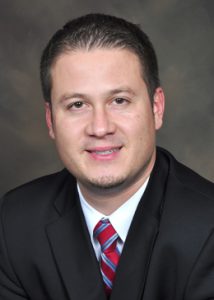 He believes that the Ministry should reinstate the writing team for Aboriginal peoples’ history. While he thinks that the Ministry is entitled to review funding to local boards and ensure school communities receive needed funds, he believes the “pause” on the $1 000 Parent Reaching Out grant to local school councils should be lifted.
He believes that the Ministry should reinstate the writing team for Aboriginal peoples’ history. While he thinks that the Ministry is entitled to review funding to local boards and ensure school communities receive needed funds, he believes the “pause” on the $1 000 Parent Reaching Out grant to local school councils should be lifted.
Ward 6 (City Ward 5) has a population of about 117 000 with people new to the country making up about 52 percent of this. The unemployment rate is about 9 percent and average household income is roughly $68 000 per year compared to $103 000 for the rest of Toronto.*
Ward 7 – Robin Pilkey – Incumbent
While Ms. Pilkey did not respond to School Magazine’s questions, information from her campaign website provides information about her positions on several issues. She is opposed to the return of 1998 sexual-education, “Reverting to an out-dated curriculum fails to meet our obligations to students to ensure their safety and access to the best information. It disrespects the diversity of our communities, in particular gay, lesbian, bisexual, transgender, two-spirit and questioning students, and their families.”
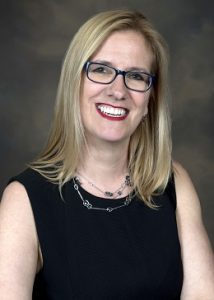
She also believes that, at the current level of provincial funding, the TDSB cannot make any inroads into its $4 billion repair backlog and adds it is “wrong” that developers are not required to direct city development charges for the communities they disrupt to TDSB schools.
Ward 7 (City Ward 4) has a population of about 109 000 with people new to the country making up about 32 percent of this. The unemployment rate is about 7 percent and average household income is roughly $100 000 per year compared to $103 000 for the rest of Toronto.*
Ward 8 – Shelley Laskin – Incumbent
Like other colleagues, Ms. Laskin didn’t respond to the questions above, but her campaign website indicates that she believes in differentiated funding “to remove barriers for some students.” Like Robin Pilkey, she is looking for TDSB access to the Education Development Charges levied on new construction. She says that the Ford government’s cancellation of the Greenhouse Gas reduction fund, chopped $25 million from money that the TDSB could have used to upgrade schools and is looking for sustainable funding to deal with the repair 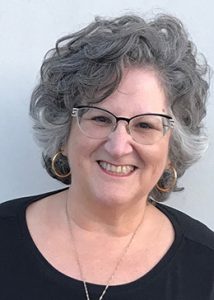 backlog.
backlog.
Ms. Laskin is opposed to the Ford government’s return to the 1998 sexual education curriculum.
Ward 8 is made up of City Wards 8 and 12. City Ward 8 has a population of about 114 000 with people new to the country making up about 39 percent of this. The unemployment rate is about 8 percent and average household income is roughly $162 000 per year compared to $102 000 for the rest of Toronto.*
Ward 12 has a population of about 107 000 with people new to the country making up about 34 percent of this. The unemployment rate is about 6 percent and average household income is roughly $155 000 per year compared to $103 000 for the rest of Toronto. *
Ward 9 – Stephanie Donaldson
Newly elected to represent Ward 9, Stephanie Donaldson gave a detailed response to our questions. Regarding the sexual education curriculum, she said that if the Ford government was really serious about a meaningful consultation, it would have left the 2015 curriculum in place, consulted with Ontarians “including students” and released a curriculum update based on the consultation. She thinks that to repeal an “entire curriculum and then stage a consultation with extremely biased questions and framing is not a genuine consultation.”
As it is, Ms. Donaldson thinks that the consultation lacks transparency since the public will have no idea how participants have responded unless results are posted, something she doesn’t believe will happen. She is already encouraging school councils across her ward to post their responses to the consultation on social media and their websites.
She believes that the Ministry of Education should immediately reinstate the curriculum writing team for Aboriginal peoples’ history and lift the “pause” on the Parent Reaching Out grants, noting that school councils have already put out funds for initiatives like family math nights, internet safety discussions and so on. Ms. Donaldson believes that the value provided “vastly outweighs” the money spent.
She also added this observation: “I knocked on thousands of doors during this election. Two things really struck me. First, the overwhelming majority of people I spoke to care deeply about public education and if they feel there are improvements to be made, are invested in participating in those improvements. Second, community members in Ward 9 do not support the way the Ford administration is handling public education. Many of the folks I talked to are not parents but still feel the collective responsibility to have access to strong public education because of how it builds up communities.”
Ward 9 is made up of City Wards 9 and 10. Ward 9 has a population of about 108 000 with people new to the country making up about 41 percent of this. The unemployment rate is about 7 percent and average household income is roughly $81 000 per year compared to $102 000 for the rest of Toronto.
City Ward 10 has a population of about 116 000 with people new to the country making up about 35 percent of this. The unemployment rate is about 5 percent and average household income is roughly $103 000 per year compared to $103 000 for the rest of Toronto.*
Ward 10 -Chris Moise -Incumbent
Mr. Moise was going to run for Toronto City Council, until the Ford government cut it down to 25 seats and he had to make a choice about running against another progressive politician.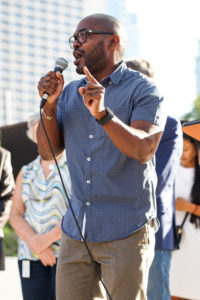 He chose to run again as a TDSB trustee for the busy downtown ward.
He chose to run again as a TDSB trustee for the busy downtown ward.
Mr. Moise did an interview with School Magazine back in September. At the time, he spoke of the difficulty his schools, like Rose Avenue PS have with fundraising for enrichment activities like itinerant arts groups and going to the theatre, in contrast to schools from more well-to-do-neighborhoods. He’s concerned about spreading resources equitably across the system. He adds that some parents think “if a kid goes to Jarvis CI and applies to university, the university deducts ten percent of the mark.” Black students he argues, are overrepresented in special education, suspension and expulsion programs. He asks why the TDSB would hire 80 coaches to “help us identify our own biases” when it could just start hiring staff who better represent the community.
Trustees play a central role in their communities – often the first people who get called when crisis hits. Schools, he thinks, are community hubs and agrees with other trustees that they need access to Education Development Charges levied on new construction projects.
Mr. Moise opposes the Ford government’s return to the 1998 sexual education curriculum, noting that “as a board we are legally obligated to teach about” consent, cyberbullying and gender identity to make sure students are safe.
Ward 10 is made up of City Wards 11 and 13. City Ward 11 has a population of about 104 000 with people new to the country making up about 32 percent of this. The unemployment rate is about 7 percent and average household income is roughly $171 000 per year compared to $103 000 for the rest of Toronto.
City Ward 13 has a population of about 104 000 with people new to the country making up about 40 percent of this. The unemployment rate is about 9 percent and average household income is roughly $75 000 per year compared to $103 000 for the rest of Toronto.*
Ward 11 – Rachel Chernos Lin
Another trustee new to the TDSB, Ms. Chernos Lin responded to the questions we sent her. She is not impressed with the consultation process set out by the Ford government, initially over the sexual education curriculum. She says that the questions are “formulaic” and in the telephone town hall section of the consultation, comments are often cut off. She doesn’t think that the government is really interested in hearing what parents think about education. The Ford government should not have “rolled back (the sexual education curriculum) to 1998.”
Students need access to a modern curriculum
Ms. Chernos Lin also believes that the Ministry of Education should resume the curriculum writing team for Aboriginal peoples’ history, arguing that it should follow the recommendations of the Truth and Reconciliation Commission.
As for the “pause” placed on school council to hold information nights, she believes that the government should at least have honored grants applied for this year. She says it’s “ironic that a government calling itself ‘For the Parents’ has halted money that is meant to go toward parent engagement.” Since parent engagement is a key to student success she believes the pause is “disheartening.”
From the information posted on her campaign website, Ms. Chernos Lin is also concerned about cuts to special education over the past several years. With her ward’s growing population, she thinks it is time to deal with infrastructure and school maintenance to ensure that students can attend safe school in their communities.
Ward 11 (City Ward 15) has a population of about 102 000 with people new to the country making up about 40 percent of this. The unemployment rate is about 8 percent and average household income is roughly $216 000 per year compared to $103 000 for the rest of Toronto.*
Ward 12 – Alexander Brown –Incumbent
Mr. Brown responded to our questionnaire. He says he supports the 2015 Health and Physical Education curriculum and doesn’t think that there will be widely held support for the return to one from 1998, since as he says, “it doesn’t do enough to ensure our children have the knowledge they need to remain safe.” He also supports the reinstatement of the curriculum writing team on Aboriginal peoples’ history. As for as the “pause” on funding for parent council engagement, he believes the grants for this year should be honored while the  Parent Reaching Out program is reviewed since parent engagement is essential.
Parent Reaching Out program is reviewed since parent engagement is essential.
On his campaign website, Mr. Brown calls for more adults in schools at all levels to ensure safety. In a similar vein, he stresses the need to follow and review Board policies on equity, bullying and discrimination, while supporting equitable access to specialized programming in the arts, French Immersion, along with Science Technology Engineering and Mathematics. He also thinks a needs-based funding formula, based on current information about students ought to come into force.
Ward 12 (City Ward 18) has a population of about 119 000 with people new to the country making up about 61 percent of this. The unemployment rate is about 9 percent and average household income is roughly $87 000 per year compared to $103 000 for the rest of Toronto.*
Ward 13 – James Li
A new trustee-elect, Mr Li did not respond to School Magazine’s questionnaire. His campaign material says he wants to have schools focus on Science Technology Engineering and Mathematics (STEM), improve financial management of schools, improve school safety while reducing bullying and set up a parents’ representative committee for his ward.
Ward 13 (City Ward 17) has a population of about 110 000 with people new to the country making up about 63 percent of this. The unemployment rate is about 9 percent and average household income is roughly $87 000 per year compared to $103 000 for the rest of Toronto.*
Ward 14 – Trixie Doyle
Ms. Doyle is a new trustee-elect. She did not respond to the School Magazine questionnaire, but calls for changes to the 20-year-old provincial funding formula and believes that trustees need to be directly involved in developing the TDSB annual budget so they can better understand it. She says that students shouldn’t have to be bused out of their neighborhoods to another school if their own is full and thinks that other educational uses may be found for schools that are considered to be under-capacity. Like many trustees, she is worried about the state of repair of TDSB schools, with leaking roofs, overheating and broken boilers.
Ward 14 (City Ward 16) has a population of about 95 000 with people new to the country making up about 53 percent of this. The unemployment rate is about 9 percent and average household income is roughly $81 000 per year compared to $103 000 for the rest of Toronto.*
Ward 15 – Jennifer Story – Incumbent
Responding to the questions above, Ms. Story remarked that the education consultation is odd in “numerous ways. Parents had been hoping for in-person consultations. The restrictions on length of submission are too short, the telephone town hall contributions are being screened. It’s extremely restrictive.” She believes that the curriculum writing sessions for Aboriginal history should be resumed immediately and that the province should continue to fund the Parent Reaching Out (PRO), saying that it is a “small amount of money with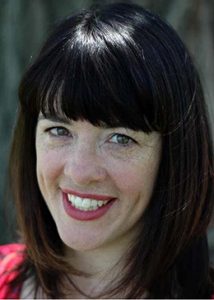 significant benefits.”
significant benefits.”
On her campaign website, Ms. Story’s concerns revolve around good governance, increasing revenues to the TDSB and bolstering childcare in the schools.
Ward 15 (City Ward 14) has a population of about 107 000 with people new to the country making up about 31 percent of this. The unemployment rate is about 7 percent and average household income is roughly $101 000 per year compared to $103 000 for the rest of Toronto.*
Ward 16 – Michelle Aarts
Newly elected for Ward 16, Michelle Aarts told School Magazine that she does not believe the process set by the Ministry of Education “qualifies as consultation”, since this implies that there is a two-way discussion taking place, rather than “filling out an anonymous survey or providing pre-screened comments on the phone.” She also points out that the questions are on far too broad an array of topics and you don’t even need to live in Ontario to take part.
Trustee Aarts agreed that the curriculum writing team for Aboriginal peoples’ history should resume its work since accurate Indigenous history provides a “critical step” in combating discrimination and inequity in communities. She was also disappointed that funding was paused for Parents Reaching Out (PRO) grants since, as she says, parent engagement is critical to student success, yet some communities can’t raise their own funds to support it. She called the cancellation an “insult to parents who volunteered their time preparing grant applications.”
She adds that she sees schools as community hubs open to neighbours and families, wants TDSB to address the inequities that surface over poverty, racism, overcrowding, access to resources and childcare. Ms. Aarts concluded by noting that “School Boards need to be vigilant, now more so than ever, to ensure that their policies and protocols support equitable education and support positive school-family relationships.”
Ward 16 (City Ward 19) has a population of about 109 000 with people new to the country making up about 32 percent of this. The unemployment rate is about 8 percent and average household income is roughly $104 000 per year compared to $103 000 for the rest of Toronto.*
Ward 17 David Smith- Incumbent
School Magazine interviewed David Smith just before the election. He was first elected trustee in 2010. His focus has been on anti-bullying, and working with community groups to provide nutrition programs for schools that don’t meet the income cut-off for extra funds through the Learning Opportunity Index. He says he pushed to have solar panels put on 22 schools.
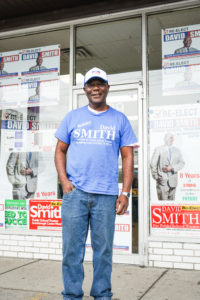 What about the sexual education curriculum? He says he’s torn. He doesn’t like the idea of rolling it back, but adds “if I could pick out the sexual education part. I have reservations about that.” Still, Mr. Smith acknowledges, you can’t cherry pick and so the TDSB needs to keep it all.
What about the sexual education curriculum? He says he’s torn. He doesn’t like the idea of rolling it back, but adds “if I could pick out the sexual education part. I have reservations about that.” Still, Mr. Smith acknowledges, you can’t cherry pick and so the TDSB needs to keep it all.
He believes that many in his community are caught between their homeland and their lives in Toronto and look at schools as places to recapture some of what they’ve left behind. Schools might become churches, cricket fields, senior centres and so on.
Principals, David Smith says, “need to be more vigilant and understanding of the communities they work in,” adding that trustees need more leeway to help them do that. He’s frustrated that trustees aren’t in the loop when parents start to raise concerns about their schools.
He’s also concerned about the mental health issues he sees in his community, all of which he thinks is made worse by marital breakdown and unemployment. He would like to see more Child and Youth Workers in the schools.
Ward 17 (City Ward 21) has a population of about 113 000 with people new to the country making up about 56 percent of this. The unemployment rate is about 9 percent and average household income is roughly $71 000 per year compared to $103 000 for the rest of Toronto.*
Ward 18 – Parthi Kandavel – Incumbent
While Parthi Kandavel didn’t respond to questions sent to him about some of the current issues in Toronto education, his campaign website notes his previous activity as a TDSB trustee in improving educational programming, collaborating over Board accountability and working with the community over Ward Councils.
Ward 18 (City Ward 20) has a population of about 110 000 with people new to the country making up about 46 percent of this. The unemployment rate is about 10 percent and average household income is roughly $79 000 per year compared to $103 000 for the rest of Toronto.*
Ward 19 – Zakir Patel
Newly elected trustee, Zakir Patel also didn’t respond to School Magazine’s questions and had no website information on his views of education in Ward 19. However, on his Facebook site he said more money needs to go towards school repairs, that he will build on the TDSB’s strategic plan, supports resources for special needs students and will stand up for parents.
Ward 19 (City Ward 24) has a population of about 102 000 with people new to the country making up about 54 percent of this. The unemployment rate is about 11 percent and average household income is roughly $72 000 per year compared to $103 000 for the rest of Toronto.*
Ward 20 –Manna Wong – Incumbent
In an interview with Manna Wong, just before the municipal election, she told School Magazine that she worries what the Ford government will do next to the education in the province. She supports the 2015 sexual education curriculum saying that students need “facts to be healthy members of the community so we can live together.” About the recent walkout of secondary students across Ontario, protesting the move, she says “we need more kids to go out and protest and tell their parents.”
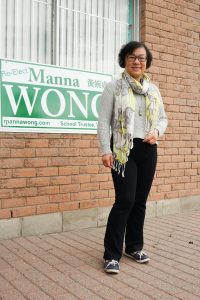 Ms. Wong also points out the limits to trustee responsibilities and cuts to their staff, office space and discretionary spending that followed a 2015 report on TDSB governance. There is a problem with rigid thinking if there is no local control and she brings up the example of her schools, some of which are half-empty while others are overcrowded: “we don’t have the local means to deal with this discrepancy.” Manna Wong believes the school boards need taxing powers to meet what the provincial funding formula ignores- huge issues like the building repair backlog.
Ms. Wong also points out the limits to trustee responsibilities and cuts to their staff, office space and discretionary spending that followed a 2015 report on TDSB governance. There is a problem with rigid thinking if there is no local control and she brings up the example of her schools, some of which are half-empty while others are overcrowded: “we don’t have the local means to deal with this discrepancy.” Manna Wong believes the school boards need taxing powers to meet what the provincial funding formula ignores- huge issues like the building repair backlog.
For years Ms. Wong says, she’s been after the Ministry of Education to give the TDSB access to information about local developments and the money that comes from them. Some of this money she thinks, should go towards arts programmes in schools and support for the mental health of the students in her charge. Contrary to the Ford government, she wants to see arts programmes expand.
Ward 20 (City Ward 22) has a population of about 105 000 with people new to the country making up about 69 percent of this. The unemployment rate is about 10 percent and average household income is roughly $76 000 per year compared to $103 000 for the rest of Toronto.*
Ward 21 – Yalini Rajakulasingam
Newly elected as a TDSB trustee, Yalini Rajakulasingam didn’t respond to School Magazine’s questionnaire. On her campaign website she says that she was a graduate of local schools and believes that the TDSB needs to invest the arts and prioritize mental health.
Ward 21 (City Ward 23) has a population of about 99 000 with people new to the country making up about 67 percent of this. The unemployment rate is about 10 percent and average household income is roughly $80 000 per year compared to $103 000 for the rest of Toronto.*
Ward 22 – Anu Sriskandarajah
Also new to the TDSB as trustee, Anu Sriskandarajah did not comment on our questions. From her campaign information, she believes in integration of Science, Technology, Engineering, Arts and Math in classrooms. She supports citizenship education and wants to ensure that schools can provide for students emotional and physical well-being. She says she will advocate for more before and after school childcare spaces, address school repair issues and turn schools into community hubs.
Ward 22 (City Ward 25) has a population of about 102 000 with people new to the country making up about 52 percent of this. The unemployment rate is about 9 percent and average household income is roughly $100 000 per year compared to $103 000 for the rest of Toronto.*
*Adapted from Statistics Canada, Census 2016, Available from the Toronto City Planning Website

